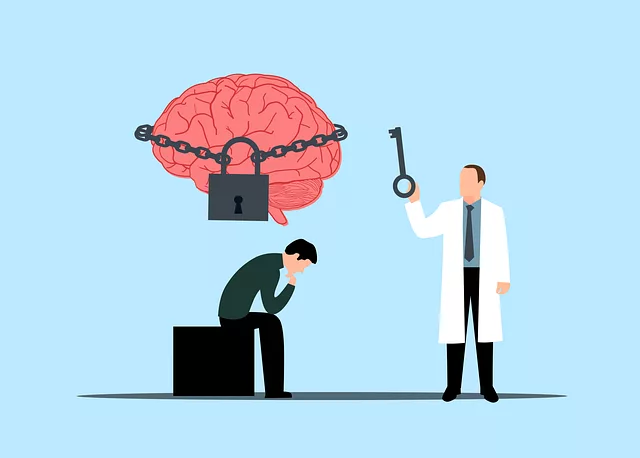Transform Your Well-being with In-Network Kaiser Specialists
Kaiser's integrated healthcare network offers a comprehensive mental well-being program with a…….
In today’s fast-paced and often stressful world, mental health has emerged as a paramount concern, driving the need for innovative therapeutic approaches. Among these, ‘Kaiser therapists in network’ have garnered significant attention for their unique model of care, which combines access to a vast network of professionals with evidence-based treatments. This article aims to provide an extensive exploration of this topic, delving into its definition, global impact, economic implications, technological innovations, regulatory landscape, and the challenges it faces. By examining these aspects, we will uncover how Kaiser therapists in network are reshaping the mental health care industry and improving patient outcomes worldwide.
Kaiser therapists in network refer to a collaborative system of mental health professionals who work together to provide comprehensive and accessible therapy services. At its core, this model involves:
Network Formation: A central organization, often named after its founder or a key institution, establishes a network comprising various specialists such as psychologists, psychiatrists, social workers, and counselors.
Interconnected Care: Members of the network collaborate, sharing patient information and working together to develop individualized treatment plans. This interconnectedness ensures continuity of care, even if a patient requires specialized services.
Evidence-Based Practice: Therapists within the network adhere to evidence-based therapeutic modalities, ensuring that treatments are effective and backed by research. Common approaches include Cognitive Behavioral Therapy (CBT), Dialectical Behavior Therapy (DBT), and Mindfulness-Based Interventions.
The concept of Kaiser therapists in network has its roots in the mid-20th century when mental health care was often fragmented, with patients facing challenges in accessing specialized services. This led to the development of integrated healthcare systems, aiming to provide holistic and coordinated care. Over time, these networks evolved to include a diverse range of professionals and therapeutic approaches.
One notable early example is the Kaiser Permanente Health Plan, which pioneered comprehensive, patient-centered healthcare in the 1940s. Their model included an extensive network of medical providers, fostering collaboration and efficient access to care. This foundation laid the groundwork for the modern Kaiser therapists in network, which now thrive in various forms globally.
The influence of Kaiser therapists in network extends far beyond their original context, with many countries adopting similar models to improve mental health care accessibility and quality. This global impact is evident across several regions:
North America: The United States has seen a significant rise in community-based therapy networks, inspired by the Kaiser model. These networks often partner with local clinics and healthcare systems to provide door-to-door services, catering to diverse populations.
Europe: Countries like the UK, Germany, and France have implemented integrated mental health care systems, drawing from the Kaiser approach. For instance, the NHS in the UK has introduced network-based models to improve access to therapy, particularly in underserved areas.
Asia: Japan, South Korea, and China have also embraced network therapy models, adapting them to their unique healthcare systems. These networks often focus on cultural sensitivity and community engagement to address mental health disparities.
The global adoption of Kaiser therapists in network is driven by several key trends:
Increasing Mental Health Awareness: Growing awareness campaigns and destigmatization efforts have led to a higher demand for mental health services worldwide. This shift has prompted healthcare systems to seek efficient and accessible delivery models.
Technology Integration: The integration of technology, such as telemedicine and digital therapy platforms, has made remote therapy sessions more feasible, expanding access to care, especially in rural or underserved areas.
Collaborative Care Models: There is a growing recognition of the benefits of collaborative care teams, where primary care providers work alongside mental health specialists, improving overall patient outcomes and satisfaction.
The economic landscape surrounding Kaiser therapists in network is dynamic and multifaceted:
Market Growth: The global mental health care market, driven by increasing demand and aging populations, is expected to reach USD 382.4 billion by 2027, according to a report by Grand View Research. Within this, network therapy services are gaining traction as cost-effective and efficient solutions.
Investment Trends: Private equity firms and venture capitalists have shown significant interest in mental health tech startups, including those offering network therapy platforms. This investment surge reflects the market’s potential and the industry’s readiness for innovation.
Public Funding: Governments worldwide are increasingly allocating funds to improve access to mental health services, with a focus on community-based and collaborative care models. These investments support the expansion of Kaiser therapists in network.
From an economic perspective, Kaiser therapists in network offer several advantages:
Reduced Costs: By providing integrated care and avoiding unnecessary hospitalizations, these networks can lower overall healthcare costs. A study by the Rand Corporation found that coordinated care models, similar to Kaiser networks, can reduce healthcare expenditures while improving patient outcomes.
Enhanced Productivity: Therapists within the network can optimize their time by sharing resources and knowledge, leading to increased productivity and efficiency.
Economic Impact on Communities: Improved access to mental health services through these networks can positively impact local economies, as individuals with better mental well-being are more likely to contribute productively to society.
Technology has played a pivotal role in transforming Kaiser therapists in network, enhancing their reach and capabilities:
Telehealth: The rise of telehealth has enabled therapists to provide services remotely, breaking down geographical barriers. This is especially beneficial for rural communities and individuals with limited mobility.
Digital Therapy Platforms: Innovative digital platforms offer interactive therapy sessions, mood tracking, and personalized resources, making mental health care more accessible and engaging. Examples include Headspace, Calm, and BetterHelp.
Artificial Intelligence (AI) and Machine Learning: AI-powered tools assist in patient screening, treatment planning, and even virtual therapy sessions. These technologies can enhance efficiency and personalize treatment recommendations.
The future of technology in Kaiser therapists in network holds immense promise:
Personalized Care: Advanced analytics and AI can enable more tailored treatment plans based on individual patient needs and preferences.
Virtual Reality (VR) Therapy: VR has shown potential in treating various mental health disorders, offering immersive experiences for exposure therapy and other interventions.
Data Integration: Seamless integration of patient data from various sources can provide a holistic view of an individual’s mental health, enabling more effective care coordination.
However, challenges remain, including ensuring digital equity to avoid leaving marginalized communities behind and addressing privacy and security concerns related to electronic health records.
The development and operation of Kaiser therapists in network are guided by various policies and regulations, which vary across jurisdictions:
Licensing and Certification: Therapists within the network must adhere to strict licensing and certification requirements set by their respective regulatory bodies. These ensure that professionals meet specific standards of education, training, and practice.
Data Privacy Laws: With the increasing use of digital platforms, networks must comply with data privacy regulations like HIPAA (Health Insurance Portability and Accountability Act) in the US or GDPR (General Data Protection Regulation) in Europe to protect patient information.
Reimbursement Policies: Healthcare insurance providers have specific policies regarding reimbursement for network therapy services. Networks need to negotiate rates and ensure coverage for their patients.
Policies and regulations play a crucial role in shaping the landscape of Kaiser therapists in network:
Network Approval and Monitoring: Regulatory bodies often oversee the establishment and operation of mental health networks, ensuring they meet quality standards and patient protection measures.
Reimbursement Negotiations: Favorable reimbursement policies can encourage more providers to join networks, expanding access to care. Conversely, complex or restrictive regulations may hinder network growth.
Ethical Guidelines: Professional organizations set ethical guidelines for network therapists, ensuring patient confidentiality, informed consent, and responsible practice.
Despite their many benefits, Kaiser therapists in network face several challenges:
Geographic Coverage: Ensuring comprehensive coverage, especially in rural or underserved areas, remains a challenge. Telehealth can help mitigate this but requires adequate infrastructure.
Provider Availability and Retention: Attracting and retaining qualified therapists within networks can be difficult, leading to potential service gaps. Incentives and career development programs are essential to address this.
Data Exchange and Interoperability: Seamless sharing of patient data across different systems and providers is crucial for effective network care. Technical barriers and interoperability issues can hinder this process.
Criticisms of Kaiser therapists in network often revolve around issues of quality, access, and accountability:
Quality Assurance: Maintaining consistent quality across a network can be challenging. Implementing robust monitoring systems, peer review processes, and continuous training can ensure high-quality care.
Access to Specialized Services: While networks aim to provide a range of services, certain specialized treatments may still be limited. Address this by fostering collaborations with external specialists and offering referral services.
Accountability and Transparency: As networks expand globally, ensuring transparency in operations, pricing, and performance metrics becomes critical. Transparent reporting and independent audits can address these concerns.
In a bustling metropolitan city, a community-based Kaiser therapist network was established to serve diverse populations. The network consisted of 20 therapists, including psychologists, social workers, and psychiatrists, who collaborated through a centralized digital platform.
Key Strategies:
Outcomes:
A rural region in a developing country faced challenges providing mental health services to its scattered population. A Kaiser therapist network was introduced to address this gap.
Approach:
Impact:
The future of Kaiser therapists in network holds immense potential, with several growth areas and emerging trends:
Global Expansion: As global awareness of mental health increases, more countries will adopt network therapy models, leading to a more interconnected global network.
Integration with Primary Care: Closer collaboration between mental health networks and primary care providers is expected, improving coordinated care and reducing the stigma associated with seeking mental health services.
Personalized Medicine: Advancements in technology and data analytics will enable more tailored therapy plans, catering to individual patient needs and preferences.
To capitalize on these prospects, Kaiser therapists in network should focus on:
Digital Infrastructure: Investing in robust digital infrastructure and cybersecurity measures to support remote services and protect patient data.
Cultural Competence Training: Continuously training therapists in cultural sensitivity and diversity to cater to diverse patient populations effectively.
Research and Innovation: Encouraging research partnerships and innovation to explore new therapeutic approaches and technologies, ensuring the network remains at the forefront of mental health care.
Kaiser therapists in network represent a significant advancement in mental health care, offering accessible, collaborative, and evidence-based therapy services. With their global reach and impact, these networks are transforming traditional healthcare models, ensuring that individuals worldwide have access to high-quality mental health support. As technology continues to evolve and policies adapt, the future of Kaiser therapists in network looks bright, promising to revolutionize mental health care and improve lives worldwide.
Q: How do Kaiser therapists in network ensure patient confidentiality?
A: These networks adhere to strict data privacy laws and ethical guidelines. They employ secure digital platforms, encrypt sensitive data, and maintain strict confidentiality agreements with all providers.
Q: Can patients choose their therapist within the network?
A: Yes, many networks offer options for patients to select a therapist based on their preferences, including specialties, gender, and cultural background. However, some cases may require referral by a primary care provider.
Q: Are Kaiser therapist networks covered by insurance?
A: Insurance coverage varies. Networks often negotiate rates with insurers, and many plans cover network services. Patients should check with their insurer and the specific network for details on reimbursement policies.
Q: How do these networks address language barriers?
A: By employing therapists who speak multiple languages and providing translation services, they ensure effective communication and access for linguistically diverse populations.
Q: Can Kaiser therapist networks provide crisis intervention services?
A: Yes, many networks are equipped to handle crises and offer urgent care services through on-call therapists or specialized crisis hotlines, ensuring immediate support when needed.

Individuals seeking Cognitive Behavioral Therapy (CBT) within the Kaiser healthcare framework can ac…….

The Kaiser Network is a leading healthcare organization committed to providing accessible, high-qual…….